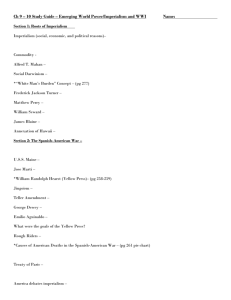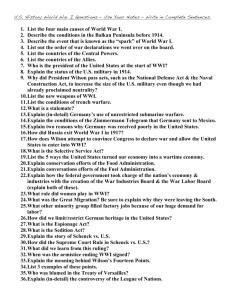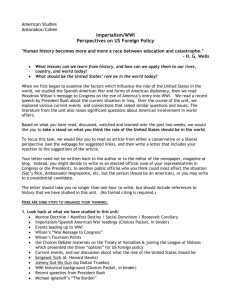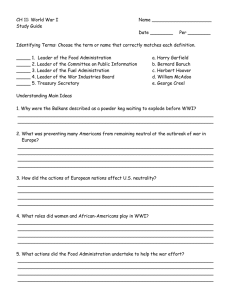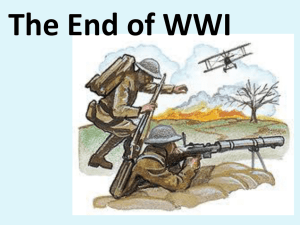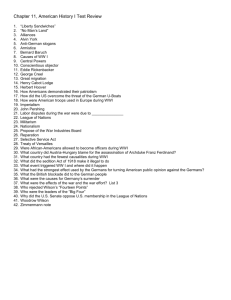Presentation
advertisement
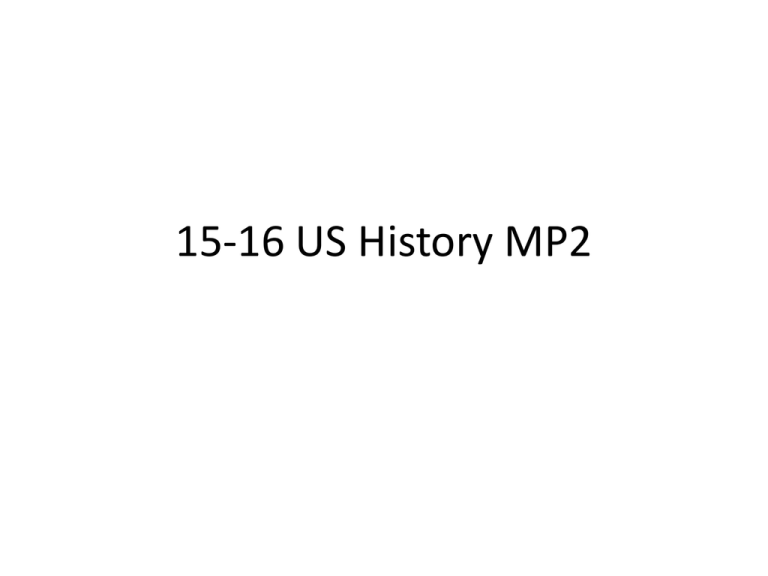
15-16 US History MP2 Day 1 Bellringer • We have a common assessment today over the whole MP1. It was district-made, so I don’t know exactly what is on it. Spend a few minutes studying your notes. Review Questions • • • • • • • What are the 7 principles of gov’t? What did the Dec of Ind do? The Constitution? What was the late 1800’s called? Why? When/why did Americans move West? What were the problems during the Gilded Age? How did factories help/hurt America? What were the goals of the Progressive Era? Day 2 Bellringer • Write 2-3 sentences about this headline/cover and what you think about the story (yes, this is a real magazine cover, I have not doctored it in any way). Sensationalism • Today, many stories are embellished, exaggerated, or made up completely. • Tabloids are the MOST guilty of this, but they are not the only ones guilty. This is today called sensationalism (this is also why murders/fires/etc are covered so often, it sells papers and gets viewers). • 100 years ago, this was seen in YELLOW JOURNALISM - exxagerated or falsified stories, especially during the turn of the 20th century • https://www.youtube.com/watch?v=4PK5XvS xJhU thumbs up/down • • • • • • • • Cuba was a free nation b/f the war We owned cuba after the war We were worried about our coffee bean crop We fought Mexico in this war We lost territory We gained philippines We gained several places War took only a few months to fight Jarrett book p 140 • In your spiral/notebook, complete the graphic organizer, with 4 pts per box. I will check this, we will go over it in 30 minutes, then we will continue with more information. 1-what boat sinking led to the Spanish American War 2-List 3 areas we got after the SA War 3-Define yellow journalism 4-What were the 4 causes of WWI? 5-What do we call imperialism in America? 6-What 3 things led to the US entering WWI 7-What was Wilson’s plan after WWI called 8-Why didn’t the US gov’t like the League of Nations 9-What was the term for the 1920s culturally 10-what did the 18th and 21st amendment do 11-what issue was at the center of the Scopes Trial 12-What date was Black Tuesday 13-What country took blame for WWI 14-List 4 causes of the Depression 15-What were FDR’s 3 R’s 16-What are 3 New Deal agencies we still have today 17-what was the geographic crisis at the same time 18-write out the Day 13 Bellringer – question and answer 19-list 5 new technologies in WWI 20-Define New Deal Now that we had territories • American Expansion/Imperialism – Gaining territory/taking over foreign lands – Needed raw materials for production – Needed markets to sell products – Needed naval bases for our military – Wanted to show our dominance – Wanted to “spread” our culture and advances – Alfred T. Mahan, need for Navy, need for islands A penny grade for your thoughts • You will write a one page paper telling why you think it was a good thing or bad thing for the US to expand/be imperialist. You may mention the points on the other side, but it needs to be clear that you have a well thought opinion as to whether it was good or bad. you can write with the view of 115 years of history since the S-A War, but it should focus on those early points as well. Day 3 Bellringer • Why is America the greatest nation in the world? • https://www.youtube.com/watch?v=RyzDRc3 4l2g • As we watch the clip, come up with a list of 5 reasons people would say we ARE the greatest nation, and 5 reasons people would say we are NOT Are we the greatest? • Why yes? – Accomplishments – Advances – Strength • Why no? • Problems • Rac/sex/age/etc/ isms -too strong - 100 years ago, we MOS DEF thought we were the greatest nation, which made us: • • • • • Spanish American War Take control of several Pacific islands Expand trade into China and Japan “Take the isthmus” Served as informal protector/police of Latin Am. – Monroe Doctrine and Roosevelt Corollary – MD says we will intervene in colonization in the Western Hemisphere; RC gives us reason to fight in S. America Quick Facts about Our Imperialism • Platt Amendment – gave us some influence in ____, said we could intervene there • Sphere of _________– countries were unofficially “in” other countries • Open Door Policy – ___said anyone was free to trade with _____(how nice of us) – partly led to ____ Rebellion • Matthew Perry – opened trade with _____ • ______Canal – needed for faster sea travel • TR – bold as President, divisive b/c of actions Quick Facts about Our Imperialism • Platt Amendment – gave us some influence in Cuba, said we could intervene there • Sphere of influence – countries were unofficially “in” other countries • Open Door Policy – WE said anyone was free to trade with China (how nice of us) – partly led to Boxer Rebellion • Matthew Perry – opened trade with Japan • Panama Canal – needed for faster sea travel • TR – bold as President, divisive b/c of actions • Sanford Dole – annexed Hawaii The Canal • • • • • Why in Panama? Why did we need it? Who got the land? How? What were the challenges with the construction itself? Make a work-log • You are going to create a work log (in your notes, I will check by walking by), as if you are the foreman of part of the Panama Canal meeting. • This needs to include information about the work the crews did, the hardships, the diseases they faced, and the glory of doing such an amazing thing. Work log Day 1 • Jan. 18. 1906; • Today. We started construction on the East end of the Canal. It is amazing to think that in ten years, we will have built one of the finest modern advances in the world. • Jimmy’s ankle is healing nicely from his break a few weeks ago. The doctor says he should be able to be back on it an working in another week or two. • Mike is infirmed with the fever, we are trying to get more medicine and bug nets for the beds, but there are so many men down here, it is tough to have supplies for them all. Day 4 Bellringer • How do you think the President (not necessarily Obama, but whoever is President at any given time) should act in relation to foreign presidents/kings/leaders? Common Assessment Update • I would say grades were bad, but that would be being generous. • Grades were REALLY bad, which means 2 things. – Your averages went down with a bad test grade – You weren’t prepared for the CA • Next class, you are going to do “corrections” to bring the grade up. You will write the answer as a complete sentence, and then write a sentence saying WHY. I TOOK THE ISTHMUS! • Roosevelt was BOLD, and people either love or hate him for that. • Presidents today (in either party) do not act like this, which is good and bad. Compare the 3 • Draw a “t” chart, but with three sections. For each President (TR, Taft, Wilson), include the NAME of their foreign policy, the RATIONALE of it, and their GOALS. Also, include how well it worked. • TR – Big Stick Diplomacy – “speak softly but carry a big stick.” The idea was that with a giant military (?), no one would dare mess with us. Goal was to dominate. Worked, but we were not well liked. • Taft – Dollar Diplomacy – “substituting bullets for dollars.” Idea was that we could use money to influence areas. Goal was not to be a bully. Didn’t work near as well, and was costly. • Wilson – Moral Diplomacy – “countries will do what is right b/c it is right.” Idea was for us to be an example for others. Goal was for greater peace. Wasn’t able to follow through. Open NOTE Test • Clear phones, books, purses, etc. from your desk. • You may use YOUR notes (this would include the various charts, etc we have done the past several class days). • Do NOT talk, do not look around the room, do not get your phone out. Day 5 Bellringer • What did we call imperialism in the US? • Chp 9 test Day 6 Bellringer • List 3 different reasons wars have started that you know of (at any point in history)…this does not have to be only in the US Draw this Chart – for each thing on the next slide, put it in the correct column Cause of WWI Reason for US Entry into WWI Imperialism Alliance Economic system Rivalries Nationalism Militarism Zimmerman Note Unrestricted Sub Warfare Germany Declares War American Neutrality Sussex Pledge Lusitania Assassination of AFF France Turks/Ottomans Great Britain Russia Germany Serbia Assassination Archduke Franz Ferdinand Austria-Hungary Imperialism Alliance Economic system Rivalries Nationalism Militarism Zimmerman Note Unrestricted Sub Warfare Germany Declares War American Neutrality Sussex Pledge Lusitania Assassination of AFF Draw this Chart – for each thing on the next slide, put it in the correct column and define Cause of WWI Reason for US Entry into WWI American Imperialism Neutrality Germany Alliance Sussex Declares system Pledge War Unrestricted Nationalism Sub Warfare Assassination Lusitania of AFF Economic Zimmerman Militarism Rivalries Note 2. The United States Declares War German submarine warfare helped push the United States into World War I Wilson had declared neutrality, but we were eventually pulled into the war German U-Boats • Terrifying new weapon that changed the rules of naval warfare. • Americans thought it was unfair. • British encouraged anti-German feelings. 1915: Sinking of the Lusitania • British Ship • Lots of American lives lost Sussex Pledge • Sussex (French ship) is torpedoed • The Germans promised that they would begin warning ships before attacking (Sussex Pledge), then broke the pledge “…….unless the Imperial German Government should now immediately declare and effect an abandonment of its present methods of warfare against passenger and freight carrying vessels this Government can have no choice but to sever diplomatic relations with the Government of the German Empire altogether.” Woodrow Wilson, 1916 Zimmerman Note Germany approaches Mexico to make war against U.S. The Russian Revolution • • • • • 1917 Russian Czar Nicholas II is overthrown Revolution begins Russia pulls out of World War I A void is created and it is apparent that the U.S. must step up to fill their place We were “neutral,” right? • You are going to write a half page based on the question at the bottom of page 159. Day 7 Bellringer • How has the war in the Middle East over the last decade plus been fought (describe the war itself)? Review last class’s info April 2, 1917: War Declaration • “It is a fearful thing to lead this great peaceful people into war, the most terrible and disastrous of all wars, civilization itself seeming to be in the balance. But the right is more precious than peace.” (W.Wilson) Preparing for War • Initial involvement – Naval support – Led by John J. Pershing – Supplies – Arms – $3 in loans – 14,500 men Draftees and Volunteers • Congress passed a Selective Service Act in May, 1917 • By November 24 million men had registered for the draft • American Expeditionary Force (AEF) with 3 million servicemen Led by John J. Pershing New Technologies https://www.youtube.com/watch?v=PK-6QKc-r9o • • • • • • • • Machine Guns Artillery Shell Poison Gas Tanks Zeppelins Planes Trench Warfare Submarines New Technologies • • • • • • Machine Guns – bang times a lot, and quickly Artillery Shell – bang but bigger Poison Gas – oh no, I can’t breath Tanks – rumble rumble Zeppelins – like a blimp, but cooler looking Planes – like really slow, ineffective planes, and no movies or free soda during the flight • Trench Warfare – dig a ditch, hide in the ditch, but whatever you do – DON’T LEAVE the ditch • Submarines – yeah yeah yeah, so Germany did ONE good thing in its history New Technologies • For each of the new technologies, write a definition, how it helped in the war, and what was bad about it • (ie) machine guns – gun that shoots multiple rounds per second without reloading; helps by letting troops defend against attack; bad b/c it can kill lots of people quickly and leads to stalemate • Words: machine guns; artillery shells; poison gas; tanks; zeppelins; planes; trenches; subs New Technologies • • • • • • • • Machine Guns Artillery Shell Poison Gas Tanks Zeppelins Planes Trench Warfare Submarines • (ie) machine guns – gun that shoots multiple rounds per second without reloading; helps by letting troops defend against attack; bad b/c it can kill lots of people quickly and leads to stalemate • Artillery Shell – large canon like gun that shoots large rounds a long distance; helps by clearing fields between trenches; bad b/c it leads to stalemate • Poison Gas – chemical weapon that kills or stuns enemy; helps by weakening the other side; bad b/c gas masks weren’t great yet, and because it leads to ??? • Tanks – tanks; good b/c gives protection from heavy rounds; bad b/c slow moving, not greatly manuverable, leads to !!! • Zeppelins – like blimps with weapons; good because there weren’t many things to attack; bad b/c slow, airplanes eventually made them obsolete • Planes – slower, not as good as today’s planes; did recon, some attacking; bad b/c they were new and not well equipped • Trench Warfare – ditches where soldiers would wait to attack; helped by offering defense from attack; bad b/c it was hard to leave the trenches • Submarines - the best thing to come out of germany since david hasselhoff…but really – boats that go underwater; good b/c they could sneak attack; bad b/c they were controversial All of this leads to… • Stalemate – neither side could gain an advantage during WWI • b/f America gets involved, the European powers spend several years without any real advances • Russia is just leaving, so Germany starts to gain momentum as… Remember the “why is America the Greatest” clip? THIS IS WHY!!! • By April, 1917, U-Boats had sunk more than 400 Allied and neutral ships • We used the CONVOY SYSTEM to transport troops overseas safely. Once in Europe • Gen. Pershing kept American troops independent of Allied forces. • Feared Allies were too used to defensive fighting. Americans Turn the Tide of the War • By November, 1918, the war was over. • Armistice signed on November 11. African Americans in World War I • 369th Infantry Regiment • All Black • Harlem Hell Fighters • Fought for the French • All received honors from French government. Influenza Epidemic • Brought to Europe by American troops • Killed more Europeans than the war. Results of World War I • 50,000 American soldiers died in battle • Many more die of disease • Losses by the Europeans were much more (8 million) • Sick and wounded outnumbered the dead • Millions of civilians died in years after war. Key Battles/Events • Sussex Pledge/Unrestricted Sub Warfare • AEF – Led by Pershing, awesome force • Battle of Argonne Forest – was supposed to be Germany’s unbeatable spot, WE WON • Treaty of Versailles – signed Nov 1918 Using your noggin’ • Using the little info in the books, as well as looking up online, you are going to write a newspaper story about the Battle of Argonne. This is to see the content, but also to see the writing ability/skill you should have. You need to write formally, and make sure to include the 5 w’s. Day 8 Bellringer • Describe the attitude towards the military, and the attitude towards people in the military in the US right now. • YOU WILL HAVE A TEST ON CHP 8 AND 9 TWO CLASSES FROM NOW • Talk about attitudes of each b/f doing t-chart Review last two classes’ info • • • • • • Start US New weapons Weapons led to What killed the most Key battle To be (involved) or Not to be (involved) • You will make a t-chart comparing the attitudes of neutrality vs involvement in WWI. You need 4 on each side. 4. Americans on the Home Front • Americans and their government took extraordinary steps at home to support the war effort. • Many women worked in wartime facilities Financing the War • War Bonds – like a loan to the government they used to pay for the war Managing the Economy • Government called on businesses to switch from producing commercial goods to war goods • Wilson set up a huge bureaucracy to manage the process • War Industries Board (Bernard Baruch) supervised the effort. Enforcing Loyalty • Committee on Public Information (George Creel) – Rally popular support for the war – Films, pamphlets, posters Fear of Foreigners • • • • Rebirth of Nativist Feelings Fear of Spies Even took away rights like free speech Schenck vs US – no free speech when it causes “clear and present danger” • Also little things that are silly almost – “Hate the Hun” – German measles = liberty measles – Hamburger = Salisbury steak – German shepherds = police dogs thumbs Poster Assn • You are going to make a poster similar to what we just saw, but based on our current/recent wars with Afghanistan and Iraq. • The point is to show that you understand the ideas of the gov’t “propaganda” we saw in WWI and WWII aimed at getting people on board with the war efforts. • Needs to be a full page. Needs to obviously take you some time. • Should have between 5-20 words. • Should have a clear message/theme. Day 9 Bellringer • Whose fault was WWI? • You will have a test next class over chp 8 and 9 5. Global Peacemaker • When the fighting ended in Europe, President Wilson pressed for a treaty that would bring peace to the postwar world Wilson’s Plan • Fourteen Points – Point 1: End all secret treaties – 2-13 dealt with a number of issues • Removal of trade barriers • Reduction of military forces • Right of ethnic groups to self-determination – Point 14: The formation of a League of Nations that would provide a forum to settle international disputes. Paris Peace Conference • Big Four – United States: Woodrow Wilson – Great Britain: David Lloyd George – France: Georges Clemenceau – Italy: Vittorio Orlando • Wilson was forced to compromise on many of his ideas League of Nations • Wilson did convince the other countries of the importance of the League of Nations • Proposal included a clause that said an attack on one country was an attack on all. • Majority of the Senate was opposed. Wilson Faces Stiff Opposition at Home Supporting the League Opposing the League Wilson Faces Stiff Opposition at Home • Senator Henry Cabot Lodge is leader of opposition • Congress feels that to sign treaty would compromise U.S. power • The U.S. does not accept the treaty Wilson Returns to Paris • Without support of Congress his position is weakened • France takes advantage of this to impose harsh penalties on Germany • The map of Europe is redrawn • Germany is forced to accept war guilt and to pay reparations. Versailles Treaty • Germany refused to sign • Gave in when threatened with French invasion Rewrite the Treaty • We know that the Treaty of Versailles did not do a great job of establishing long-term world peace (thus WWII). • so, you are going to be rewriting the treaty. – It needs to be a one page document. – Needs to make sense for the time (so don’t include that presidents should just insta-chat) – Needs to address issues with the real Treaty. Day 10 Bellringer • Test day – answer the following without looking at your notes – What single event started WWI? – What were the four MAIN causes of the war? – Who was our general in the war? – What country took the blame for the war? review Day 11 Bellringer • If Americans almost unanimously agreed that Obama was doing a great job, which PARTY would win the Presidential election next year? A Republican Decade • Republican administrations of the 1920s pursued pro-business economic policies and an isolationist foreign policy. Warren G. Harding Herbert Hoover Focus of the Republicans • Relax on enforcing antitrust laws • High tariffs (make foreign goods cost more) • Lower taxes on the wealthy/businesses • People made lots of money, though some of it was done in ways that would become problematic • Complete chart on p 179 in Jarrett – with 3 points for each box Five minute lesson on controversy in 1920’s • America was in a period of change (more on that to come) – Traditional ideas vs modern learning – Old cultural themes vs new technologies – Vices Teaching through Debate • You are going to be in a group that will debate about one of three topics. Your group will split up and write the points for BOTH sides – the point is not to “win” the argument, but to show the ideas of each side of your topic. • Grades will be based on group work AND individual sharing in the debate portion. • Topics: Prohibition, Scopes Trial, Immigration Restriction Prohibition Amendment • Took effect on January 16, 1920 • Outlawed the manufacture, distribution and sale of alcoholic beverages. • Goals: – Eliminate drunkenness – Get rid of saloons – Prevent absenteeism on the job Volstead Act, 1919 • Provide a system for enforcing the amendment • Was widely ignored especially in big cities – Kansas reported 95% compliance – New Yorkers complied at 5% • Sharpened the contrast between urban and rural values Ways to Avoid Compliance • Bootlegging: Suppliers of illegal alcohol. • Speakeasies: Illegal bars that required membership to enter. Usually disguised as another business. Organized Crime • Unexpected outcome of Prohibition was the rise of organized crime (Mafia) • Al Capone, leader Day 12 Bellringer • List your favorite of each: – Movie – Song – Book/Written work of literature Society in the 1920s • The 1920s were a time of rapid social change, in which many young people, particularly young women, adopted new lifestyles and attitudes. As its rural population decreased, the United States became an urban nation, and traditional values were increasingly challenged Following World War I • Many young people returned to the U.S. bearing the scars of the war: shell shock, permanent injury, and the effects of poison gas. • Many Americans were disillusioned with American society The Flapper • Came to symbolize this revolution – Rebellious – Energetic – Fun-loving – Bold • Helped to create what we see as modern America The Flapper Image • Hemlines rose higher (Average amount of fabric used to make a woman’s outfit shrank from 19.5 yards to 7 yards) • Cut their hair short • Gave up wide brimmed hats for close-fitting styles • Wore heavy make-up • Drank and smoked Women’s Changing Roles • Number of women in the work force was continuing to grow • Nineteenth Amendment gave women the right to vote • Eager for greater equality with men • Without meaning to the flapper brought women closer to their goal Political Situation • With the exception of the ability to vote, women’s political status changed little • Relatively few women voted at all • Voted in patterns similar to men’s Americans on the Move • Demographic changes • Urban growth and rural decline • Results – Public high school attendance grows – Loss of traditional values The Great Migration • African American Migrations, 1890 - 1920 Demographics • 1860 – 93% of African Americans live in the South • 1910 – 89% live in the South • 1930 – 80% live in the South Harlem Renaissance • Harlem became the cultural center of the United States • Population: – 1914: 50,000 – 1930: 200,000 • Not just jazz • But also for literature American Heroes • Hungry for the early values, many Americans turned to heroes to recapture that feeling – Charles Lindberg – Amelia Earhart – Jack Dempsey – Jim Thorpe – Babe Ruth – Gertrude Ederle Day 13 Bellringer • Describe the mutual benefits of Netflix and Smartphones. Mass Media and the Jazz Age • In the 1920s, the mass media provided information and entertainment as never before. The decade was an especially creative period for music, art, and literature. Mass Media • Development of a national media instead of a regional culture – Movies • Silent • The Jazz Singer • First talking picture – Greta Garbo – Charlie Chaplin – Lillian Gish • More people could read so_____ Radio • 1920 – KDKA – Pittsburgh • 1922 – 500 stations The Jazz Age • Grew out of African American music of the South • Some were horrified – Syncopated rhythms and improvisations were too suggestive and free • Harlem – Jazz Clubs – Dance Halls NAACP • Attempts to pass anti-lynching legislation • Worked to protect voting rights • African Americans still could not exercise their full political rights Day 14 Bellringer • What are three industries that developed AFTER the development of the cell phone? Prosperity in the 1920’s • • • • More automobiles – available for middle class Henry Ford – assembly line for cars Other inventions also created People wanted to buy stuff that was new • Complete chart on p 183, have 3 points for each box What if you can’t afford it? • Buying on credit – people would purchase things using an installment plan • Once they did it once, they would do it again, leads to an eventual problem • Speculation – buying with the hopes of selling at a higher price…people did this with real estate and stocks in the 1920’s • Answer questions on page 183 – half page EACH Potential Problems • What could be some problems with things people were doing in the 1920’s Issues from 20’s - Depression • OVERproduction • FAILED speculation • TOO MUCH credit • These things combined to create Day 15 Bellringer • What caused the economic issues of the mid 2000’s?

